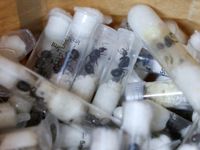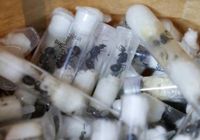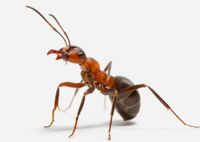In a surprising turn of events, two Belgian teenagers have found themselves at the center of a legal battle in Kenya, charged with attempting to smuggle approximately 5,000 live ants out of the country. The young men, 19-year-olds Laurent David and Sebastien Lodevickx, were apprehended at Jomo Kenyatta International Airport in Nairobi, where they allegedly planned to transport the exotic insects to markets in Europe and Asia.
According to reports from Reuters, the Kenya Wildlife Service (KWS) arrested the group, which included a Vietnamese national and a Kenyan, after discovering a staggering number of ants packed in test tubes. The authorities seized over 2,200 tubes, each containing a queen ant and worker ants, designed for discreet transport. In total, the group was found with around 5,000 ants, specifically the Messor cephalotes, commonly known as the African harvester ant.
This species is particularly valuable in the exotic pet trade due to its striking black and red coloration and substantial size. Its rarity, especially in Kenya and Ethiopia, makes it a sought-after item among collectors and pet enthusiasts. The illegal trade of such species raises significant concerns regarding biodiversity and ecological balance.
During their court appearance, the Belgian teenagers admitted to the charges of possessing and illegally trading in wild animals. However, they claimed that their intentions were innocent, stating they were collecting the ants for fun and had no knowledge of the legal implications. "We were just gathering ants for enjoyment, not realizing it was illegal," one of the teens reportedly said.
In a related case, Kenyan citizen Dennis Njenga and Vietnamese Do Hang Nguyen faced similar charges after being caught with 400 ants. The KWS emphasized that the illegal export of ants undermines Kenya's sovereign rights over its biodiversity and deprives local communities and research institutions of potential ecological and economic benefits.
Historically, Kenya has grappled with the smuggling of larger wildlife, such as elephants and rhinos, but this case marks a shift toward trafficking lesser-known species. The KWS noted that while the focus has often been on larger mammals, the illegal trade of insects like ants is equally concerning and represents a growing trend in wildlife crimes.
The arrests took place in Nakuru County, a popular tourist destination known for its national parks. Authorities found the ants meticulously packaged in 2,244 test tubes filled with cotton to maintain their viability. The estimated value of the seized ants is around one million Kenyan shillings, which is approximately $7,700 USD. Prices for ants can vary widely depending on the species and market demand.
This incident has raised alarms among Belgian observers who are concerned about the implications of such smuggling activities on wildlife conservation efforts. The KWS has reiterated the importance of protecting Kenya's unique biodiversity and the need for stricter enforcement against wildlife crimes.
As the case unfolds, it highlights the complexities of wildlife trafficking and the need for greater awareness and education regarding the legalities surrounding the trade of exotic species. With the growing demand for unique pets, authorities are increasingly vigilant against such illicit activities, aiming to safeguard both the environment and the rights of local communities.
In conclusion, the trial of these two Belgian teenagers serves as a stark reminder of the ongoing battle against wildlife trafficking, emphasizing the need for responsible stewardship of nature and adherence to legal regulations concerning wildlife trade.






